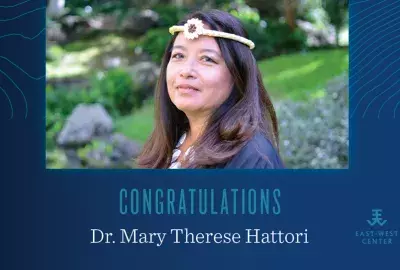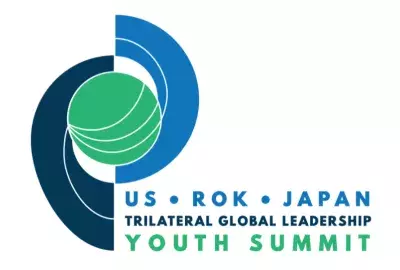Error message
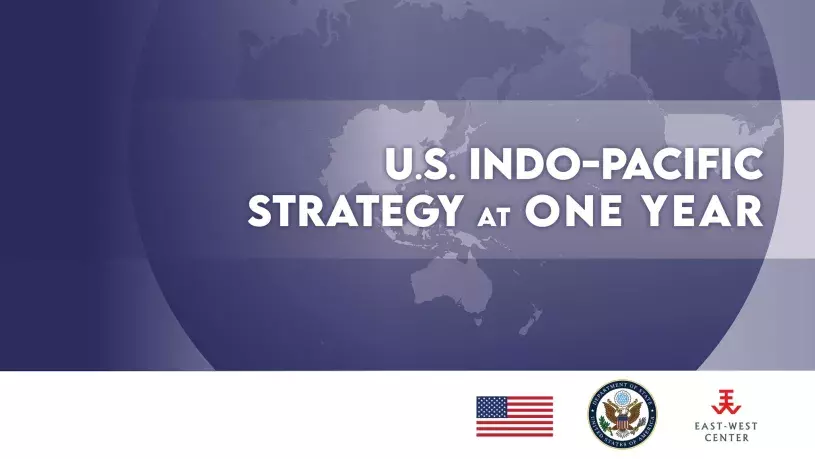
OFFICE/DEPARTMENT
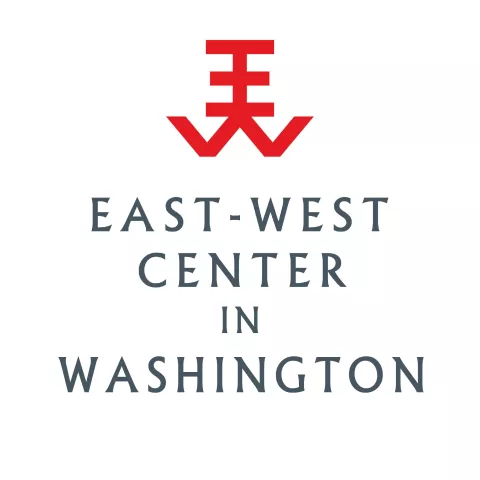
| This APB series summarized key remarks from the US Indo-Pacific Strategy at One Year event in Washington, DC. The event focused on Europe, Japan, South Korea, India, and Australia and is one of three closed in-person conferences sponsored by the US Department of State at which experts and government officials provided their insights and perspectives on US Indo-Pacific Strategy. |
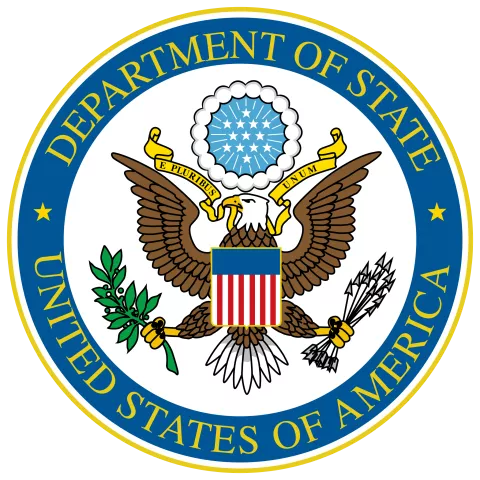
Australia at the Heart of Indo-Pacific Security Arrangement
Mark R. Watson, Director at the Australian Strategic Policy Institute (Washington DC), explains that for "Australia in particular, AUKUS and the Quad make sense when viewed against the backdrop of years enduring Chinese economic coercion, interference in domestic politics, and intimidation of Australia’s Chinese and Uyghur diaspora."
The Evolution of Indo-Pacific in Japanese Strategy
Komei Isozaki, Japan Chair Fellow at the Hudson Institute, explains that Japanese Prime Minster Shinzo Abe "should be remembered not just for the length of his tenure but also for his visionary efforts [regarding the Indo-Pacific], which were farsighted and strategic."
The United States, Japan, and Indo-Pacific Prosperity
Yukari Sekiguchi, Senior Director in the East Asia and Pacific practice at the Albright Stonebridge Group, explains that "without the prospect for lower tariffs, or reductions in other market access barriers, IPEF's greatest benefit lies in its ability to harmonize other policies and regulations, and cultivate various types of concrete cooperation among its large network of like-minded countries."
Resilience in the US Indo-Pacific Strategy
Dhruva Jaishankar, Executive Director of the Observer Research Foundation America (ORF America), explains that a "prominent feature of the Biden administration’s Indo-Pacific Strategy is resilience in the face of '21st-century transnational threats,'" and how this theme relates to public health, supply chains, alliance structures, and more.
Building Connections Within and Beyond the Indo-Pacific Region: A European Perspective
Ramon Pacheco Pardo, Professor of International Relations at King's College London & KF-VUB Korea Chair at the Brussels School of Governance, explains that "outside of relations with the United States, Europe’s strategic approach is leading to the prioritization of cooperation with Japan and South Korea—as well as Australia..."
The European Union in the Indo-Pacific
Tara Varma, Visiting fellow at the Brookings Institution's Center on the United States and Europe, explores the development of the EU Indo-Pacific strategy and how it brings " a positive agenda to the table... particularly when it comes to mitigating and adapting to the effects of climate change and fostering connectivity."
The United Kingdom and the Indo-Pacific
Dr. John Nilsson-Wright, Associate Professor at University of Cambridge and Korea Foundation Fellow at Chatham House, explains that "two motives lie behind Britain’s increased focus on the Indo-Pacific: a desire to develop a more agile foreign policy post-Brexit; and the need to engage with a region of the world that is increasingly vital to Britain’s national interest."
Japan Matters for Indo-Pacific Strategy
Prof. Masatoshi Murakami, an Associate Professor at Kogakkan University and a former career diplomat of Japan, explains how Japan is cultivating ties with G7 members, NATO, the Pacific Islands, Southeat Asia, and India, and the United States.
Reflections on IPEF's Regional Prosperity Pillar
Vikram Nehru, Distinguished Practitioner-in-Residence at the Johns Hopkins University School of Advanced International Studies, Reflections on IPEF's Regional Prosperity Pillar, recommends that the IPEF better reflect the core priorities of developing countries in the Indo-Pacific and the United States finance these core priorities by leveraging multilateral development banks.

| This APB series summarized key remarks from the US Indo-Pacific Strategy at One Year event in Washington, DC. The event focused on Europe, Japan, South Korea, India, and Australia and is one of three closed in-person conferences sponsored by the US Department of State at which experts and government officials provided their insights and perspectives on US Indo-Pacific Strategy. |

Australia at the Heart of Indo-Pacific Security Arrangement
Mark R. Watson, Director at the Australian Strategic Policy Institute (Washington DC), explains that for "Australia in particular, AUKUS and the Quad make sense when viewed against the backdrop of years enduring Chinese economic coercion, interference in domestic politics, and intimidation of Australia’s Chinese and Uyghur diaspora."
The Evolution of Indo-Pacific in Japanese Strategy
Komei Isozaki, Japan Chair Fellow at the Hudson Institute, explains that Japanese Prime Minster Shinzo Abe "should be remembered not just for the length of his tenure but also for his visionary efforts [regarding the Indo-Pacific], which were farsighted and strategic."
The United States, Japan, and Indo-Pacific Prosperity
Yukari Sekiguchi, Senior Director in the East Asia and Pacific practice at the Albright Stonebridge Group, explains that "without the prospect for lower tariffs, or reductions in other market access barriers, IPEF's greatest benefit lies in its ability to harmonize other policies and regulations, and cultivate various types of concrete cooperation among its large network of like-minded countries."
Resilience in the US Indo-Pacific Strategy
Dhruva Jaishankar, Executive Director of the Observer Research Foundation America (ORF America), explains that a "prominent feature of the Biden administration’s Indo-Pacific Strategy is resilience in the face of '21st-century transnational threats,'" and how this theme relates to public health, supply chains, alliance structures, and more.
Building Connections Within and Beyond the Indo-Pacific Region: A European Perspective
Ramon Pacheco Pardo, Professor of International Relations at King's College London & KF-VUB Korea Chair at the Brussels School of Governance, explains that "outside of relations with the United States, Europe’s strategic approach is leading to the prioritization of cooperation with Japan and South Korea—as well as Australia..."
The European Union in the Indo-Pacific
Tara Varma, Visiting fellow at the Brookings Institution's Center on the United States and Europe, explores the development of the EU Indo-Pacific strategy and how it brings " a positive agenda to the table... particularly when it comes to mitigating and adapting to the effects of climate change and fostering connectivity."
The United Kingdom and the Indo-Pacific
Dr. John Nilsson-Wright, Associate Professor at University of Cambridge and Korea Foundation Fellow at Chatham House, explains that "two motives lie behind Britain’s increased focus on the Indo-Pacific: a desire to develop a more agile foreign policy post-Brexit; and the need to engage with a region of the world that is increasingly vital to Britain’s national interest."
Japan Matters for Indo-Pacific Strategy
Prof. Masatoshi Murakami, an Associate Professor at Kogakkan University and a former career diplomat of Japan, explains how Japan is cultivating ties with G7 members, NATO, the Pacific Islands, Southeat Asia, and India, and the United States.
Reflections on IPEF's Regional Prosperity Pillar
Vikram Nehru, Distinguished Practitioner-in-Residence at the Johns Hopkins University School of Advanced International Studies, Reflections on IPEF's Regional Prosperity Pillar, recommends that the IPEF better reflect the core priorities of developing countries in the Indo-Pacific and the United States finance these core priorities by leveraging multilateral development banks.





